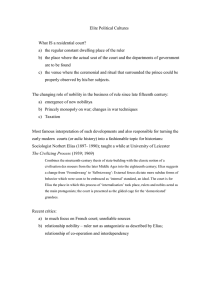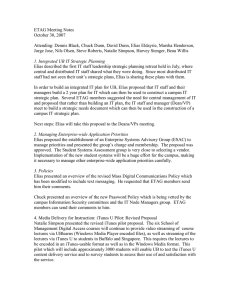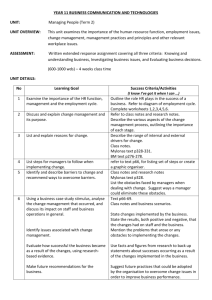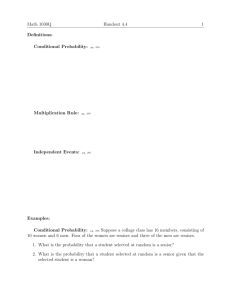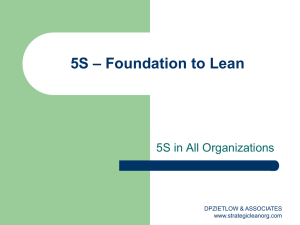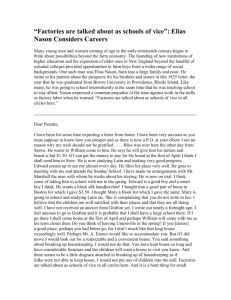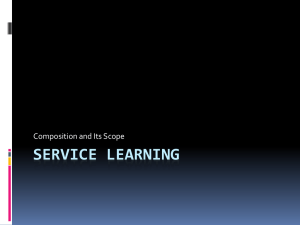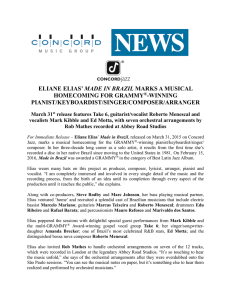'systems thinking'?
advertisement
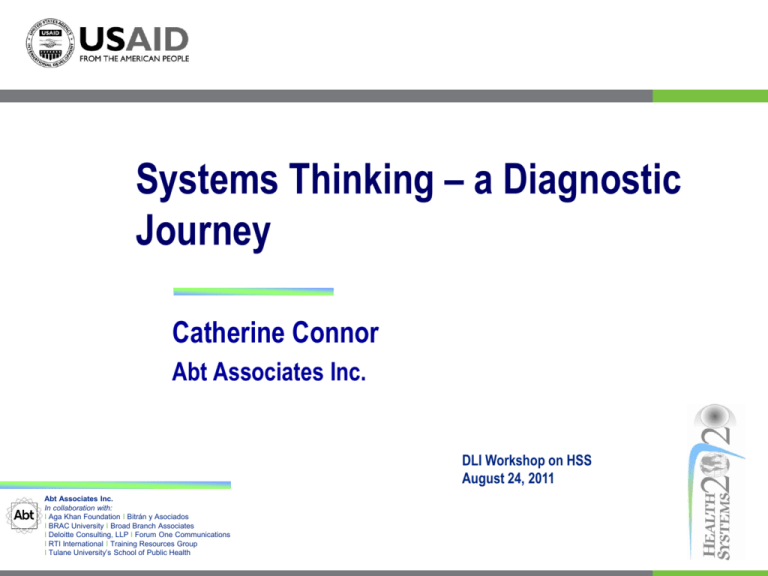
Systems Thinking – a Diagnostic Journey Catherine Connor Abt Associates Inc. DLI Workshop on HSS August 24, 2011 Abt Associates Inc. In collaboration with: I Aga Khan Foundation I Bitrán y Asociados I BRAC University I Broad Branch Associates I Deloitte Consulting, LLP I Forum One Communications I RTI International I Training Resources Group I Tulane University’s School of Public Health What we will do in this session Practice “systems thinking” by applying a technique to diagnose causes of poor health system performance Diagnostic journey or root cause analysis Use data Look for causes that you can do something about Anticipate effects of proposed interventions Why do we need to think differently? Health systems are Governance Medicines & Technology context-specific Information People non-linear Human Resources dynamic Financing Service Delivery How do we do ‘systems thinking’? Take a diagnostic journey to understand the causes of the problems we observe • Multiple, inter-dependent causes with multiple effects • Work backwards and sideways • Use data. Suspend judgment. • Look for causes that can be affected by policy or programs Where do we begin? We begin with a common performance outcome – high child mortality due to preventable, treatable disease A poor rural family is desperate because their 3 year old son Elias has severe diarrhea. • What obstacles will they face? • Why? What are the causes of these obstacles? Why did Elias get diarrhea? Why did Elias get diarrhea Poor hygiene Unsafe water source Why? Why did Elias get diarrhea? No CHWs Poor hygiene Unsafe water source Data on literacy rates and grade completion Lack basic education Poverty Centralized government not accountability to rural areas Why not treat Elias at home? Why not treat Elias at home? Don’t know home care Why? Don’t have ORT Why not treat Elias at home? Don’t know home care No community health workers Sector strategy or district health plan Why? Don’t have ORT Why not treat Elias at home? No CHWs Don’t know home care Don’t have ORT No training available Centralized government not accountable to rural areas What obstacles does the family face to get care at a health facility? What obstacles does the family face to get care at a health facility? Facility without supplies No $ for transport to nearest facility Data on stock outs Why? Data on use rates Why obstacles does the family face to get care at a health facility? Facility without supplies No $ for transport to nearest facility Poor purchasing Leakage Insufficient Few rural quantity of facilities services No roads Data on procurement and supply chain Data on # and location of facilities Why? What obstacles does the family face to get care at a health facility? Group Exercise Low Demand Limited Supply • Form groups of 4-5 • Half of the groups will analyze the causes of Low Demand • other half Limited Supply Systems Thinking Small group exercise - instructions Groups of 4-5 Half analyze the causes of Low Demand; other half Limited Supply For next 30 minutes, please: 1. Brainstorm causes and write on yellow post-it notes and map causal web on flip chart 2. What data are available to identify/prioritize causes? See hand out of data sources and write on green postit notes next to the suspected cause Systems Thinking Small group exercise – Sharing What are the causes of causes of Low Demand? Limited Supply? 2. What data are available to identify primary causes? 1. 3. Extra: Which causes/problems are more amenable to policy and programmatic solutions? Circle with marker. Systems thinking leads to better system interventions ‘A systems perspective can minimize the mess; many of today’s problems are because of yesterday’s solutions” Dr. Irene Akua Agyepong, Ghana Health Service 2009 Thank you Reports related to this presentation are available at www.HealthSystems2020.org Abt Associates Inc. In collaboration with: I Aga Khan Foundation I Bitrán y Asociados I BRAC University I Broad Branch Associates I Deloitte Consulting, LLP I Forum One Communications I RTI International I Training Resources Group I Tulane University’s School of Public Health
